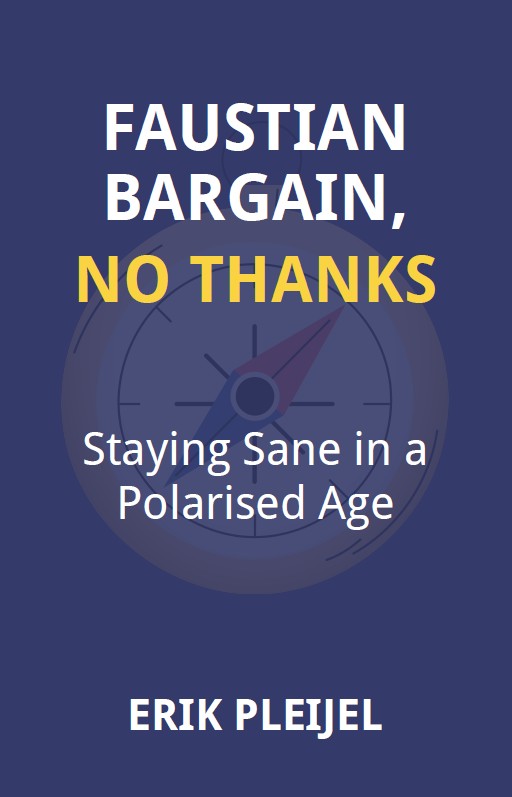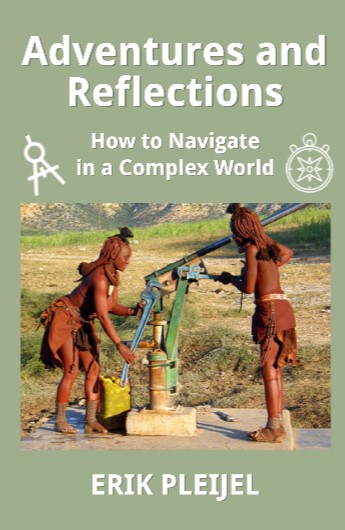A Timeless Alliance in a Stormy World
ENGLISH VERSION
Faustian Temptation: How to Build Resilience the Classical Way
if he gains the whole world
but loses his soul?”
(From the Bible.)
According to legend, a Faustian bargain is a deal with the devil, a pact in which someone trades their soul and moral integrity for power. Who has the strength to reject the offer? This is the fateful question of our time.
Demagogues – the masters of the power game – have agreed to the Faustian bargain. These figures appeal to people desperate for a saviour. They exploit emotions such as fear and pride. They prey on ignorance, sow division, and fuel prejudice. They undermine trust in democratic institutions.
Their actions betray a deep inner emptiness. To fill this void, they have an insatiable need to create a personality cult and exploit others. They have traded their moral integrity for personal gain – and they want others to make the same corrupt exchange.
Many of their followers seem to have accepted the bargain. They admire their leaders because they can flout laws and rules with impunity. They revel in the shamelessness, the buffoonery, the bullying, and the meanness. The main attraction is the intoxicating feeling of strength and power. In their enchantment, they lose both reason and compassion.
It is certainly true that economic hardship and social anxiety can fuel discontent. This can lead people to seek solutions in unbridled and extreme power politics. The question is whether it is worth the high price. Are you so desperate that you are prepared to sacrifice your soul?
Those who reject the bargain are those who cultivate faith, hope, love, wisdom, just-mindedness, moderation and courage. These seven classical virtues form the basis of a counterforce and bulwark against the allure of demagoguery. Learn the classical way to build resilience against the Faustian pact!
1. Courage: Avoid the Path to the Dark Side
We live in a world torn apart by strong passions. Debates have become trench warfare, with people hurling insults at each other. Hate and fear are spread virulently online.
Fear doesn’t bring out the best in us. In the movie Star Wars, the character Yoda famously said:
Of course, it is important to be able to feel fear and anger. They are natural responses that can, at times, be a matter of survival. Anger can be an important driving force in some situations. But unchecked, these emotions pose a significant risk.
- Fear can create delusions.
- Anger can create tunnel vision.
- Hatred can create blindness.
Fear can stir up emotions that cloud judgement and prevent us from thinking clearly. Courage is the first defence against the ‘dark side’. We must not allow fear to rule over reason. In stressful situations, it is important not to let your imagination run away with you.
Stoic courage is an important part of the spiritual immune system.
2. Just-Mindedness: Find Strength in Boundaries and Principles
“If you have authority, you can do anything you want" – fantasies of unchecked power can be exhilarating, and deeply dangerous. Such emotions cloud good judgment and fuel all sorts of twisted ideas.
To keep these emotions in check, we need the virtue of justice and just-mindedness. It is about being principled and resisting the temptations of power. Having authority does not give you the right to do anything.
Let justice rule: keep the law, act honourably and be truthful. Do this in all things, great and small, and do it even if it does not bring direct personal gain. Cultivate a sense of personal responsibility. Don't be mesmerised by grandiose displays of raw might.
Practicing restraint and acting honourably cultivate true strength. These good habits are also a safeguard against the delusions of power intoxication.
3. Love: Overcome Toxic Emotions
Why is social media so often anti-social? Why are the posts so full of mockery, abuse and petty nastiness? The answer is quite simple: Being nasty and mean can be a pleasure.
You laugh and make fun of others because it's amusing. You take pleasure in others' misfortune. Even the feeling of being wronged can become a wicked pleasure. It can provide an excuse to lash out in lustful anger.
This is often the case, but not always. There are bad things that can feel good, for example: the pleasure of being mean, the desire to judge, the sweetness of revenge, the intoxication of power. Is there anyone among us who is completely free of this and who never deceives himself?
How do we break free from this “toxic trap”? Many people believe in an all-encompassing love that illuminates the dark corners of our souls without creating fear. This belief encourages self-examination and self-knowledge. It is a core concept of the Christian faith, where it is known as divine love. It is seen as a life force that cures or at least mitigates toxic emotions.
There are good reasons to undergo this ‘detoxification’. Hatred and contempt can damage intellectual health. Moreover, those who love to hate are susceptible to manipulation. Clever demagogues can easily make them dance to their tune by pushing the right buttons.
4. Faith: Overcome Unhealthy Mistrust
Why do false conspiracy theories often become popular and spread like a virus? Perhaps the answer is this: It can be flattering to think you have a sharp mind that can spot patterns that reveal hidden secrets. Distrusting experts and scientists makes you feel incredibly clever. What they say is rejected with a dismissive sneer. They become smaller and you become bigger.
Scientists are not perfect, so it can sometimes be justified to be sceptical. But there is an unhealthy and pathological form of mistrust that comes from fear and low self-esteem. Such mistrust inflates the ego like an empty balloon.
Now, here's a remedy that might seem rather unusual, but it's surprisingly powerful. Many people believe that there is a Higher Power (God) over which we have no control. Faith then can become a spiritual exercise in giving up control, an exercise in trust. Trusting faith is like a leap into the unknown. It means accepting that there are things bigger than us and beyond our understanding.
Trusting faith is a life force that heals us from toxic mistrust. Conspiracy theories lose their appeal. Whether they are true or not is another matter. But their allure fades.
In a surprising way, faith can become a good friend of science!
The seven classical virtues.
5. Wisdom: Acknowledge the Follies of Stubborn Certainty
The feeling of absolute certainty is often no more than that: a feeling. It is rarely the product of a keen intellect. Not only that. Stubborn certainty is often reinforced by ignorance. The less you understand, the more entrenched you become in your beliefs. This tendency is exacerbated by information bubbles, where prejudices are always confirmed and never challenged.
To get out of this trap, we need to broaden our horizons and explore the world. One way is to meet people from other cultures and countries. Another is to learn about other eras by studying history. The collective experience of humanity is a vast source of knowledge.
When horizons are broadened, a new feeling arises: there is much we do not know. Socrates said that wisdom begins with recognising and admitting our ignorance.
This invites us to seek knowledge without prejudice and with a willingness to learn. Exploring the world becomes an adventure full of surprises.
6. Moderation: Avoid the Allure of Extremes
Demagogues possess a cunning intelligence that allows them to accumulate power and wealth. They are driven by an insatiable greed and gluttony. For them, ‘enough’ and ‘contentment’ are unfamiliar concepts.
It's not a good idea to elect rulers who can't rule themselves! Their lack of self-control – their inability to moderate their desires – makes them fundamentally unfit to lead. They do not have what it takes to make the world a better place: practical wisdom and good judgement. Because they foment division and polarisation, they tend to take radical positions and hold unbalanced views.
Practical wisdom, according to Aristotle, is related to moderation and self-control. It is often necessary to find the golden mean and not go too far in either direction. In decision-making situations, it is important not to overreact or underreact.
Sometimes we need to take a clear stand on an issue. But very often we have to find the right balance between two opposing poles. For example:
- Idealism and realism.
- Unity and diversity.
- Collectivism and individualism.
- Order and freedom.
It's about being able to hold together a complex reality – to be able to integrate.
7. Hope: Overcome Cynicism and the Appetite for Chaos
The gloomy state of the world makes it tempting to become cynical. It provides temporary relief and protects us from disappointment. But cynicism can also sap our vitality and deaden our spirit. We lose patience with the slow and painstaking work of improving things in small steps. It tempts us to join forces that tear down rather than build up. Cynicism can create an appetite for chaos.
What is the antidote to such destructive cynicism? Naïve optimism and rosy view of the world is fragile and easily shattered by events. Hope, on the other hand, has a spiritual quality that is stronger and deeper. It is a life force that is "not of this world" and transcends the limitations of reality. It is relatively independent of life's ups and downs and is a source of strength even when the future looks bleak.
The anti-Nazi resistance fighter Dietrich Bonhoeffer described it as “a living force, a power to hope where others give up, a power to hold one’s head up high where everything seems to fail, a power to bear setbacks, a power that does not leave the future to the pessimist but claims it for hope.”
Time for resistance
Bonhoeffer was a Lutheran pastor in Germany. When the Nazis came to power in the 1930s, he inspired young people to build spiritual resilience and equip them to resist these dark forces. People with faith like his can be the inspiration we need today.
We too live in dangerous times. Authoritarian leaders become popular by whipping up hatred and wrecking societies. They make the ‘dark side‘ thrilling and entertaining. Emotions run high. We should not panic, for fear can lead us down the same dangerous path that hinders personal maturity and development.
Let’s counter fear with courage, the allure of power with just-mindedness, toxic emotions with love, pathological distrust with trusting faith, narrowmindedness with wisdom, extremism with moderation, and cynicism with hope. We must show that the classical virtues are better and more attractive than the demagogues' power cult. Now, more than ever, we must build resilience against the Faustian bargain!





